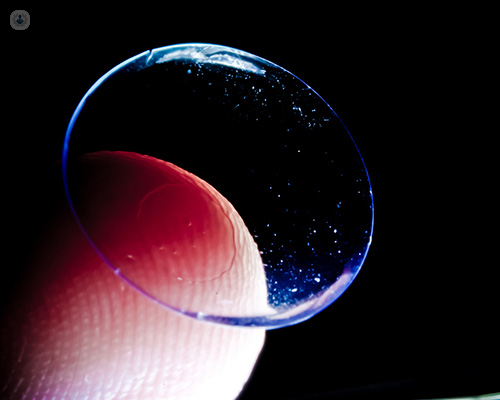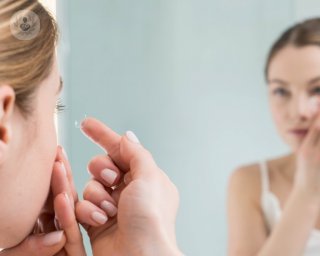Contact lenses for dry eyes
What is dry eye - and why are contact lenses for dry eyes needed?
Contact lenses for dry eyes are a solution for people with dry eye syndrome or dry eye disease, who need glasses. Dry eye syndrome is commonly referred to as simply ‘dry eyes’, and it's a very common condition which affects many people across the UK. It happens when the eyes can’t produce enough tears, therefore drying out and becoming irritated, red, and swollen.
Dry eye syndrome affects both those who wear contact lenses and those who don't, but wearing contact lenses can make your eyes feel even drier. Contact lenses can exacerbate symptoms of dry eye, making them uncomfortable to wear.
Symptoms of dry eye syndrome include your eyes feeling gritty or sore throughout the day and gradually worsening, your eyes burning or being red in colour, and temporarily experiencing blurred vision. Some may also find that their eyelids stick together in the mornings when they wake up.

What are contact lenses for dry eyes?
Because of the fact that wearing contact lenses can dry your eyes out, specific contact lenses have been designed to reduce discomfort, meaning if you prefer to wear contact lenses, you don’t have to make the change to wearing glasses. Changing contact lenses can help to reduce the symptoms of dry eyes and make your experience with lenses more comfortable overall. There are various types available, including:
- Soft lenses
- Rigid gas-permeable contact lenses
What are soft lenses for dry eyes?
Soft lenses for dry eyes are made from special material which allows the lenses to hold water. These lenses are disposable, meaning they are only meant to be worn for a day. Wearing daily disposable lenses prevents protein deposits building in the eye, which can make your eyes feel drier over time.
Rigid gas-permeable contact lenses
Rigid gas-permeable contact lenses, or RGP/GP lenses, are made of a firm plastic which is ‘permeable’, meaning it transmits oxygen. Oxygen needs to pass into the eye through the lens, reaching the cornea. In normal hard lenses, oxygen cannot reach the cornea, as the material is not permeable. With RGP lenses, the cornea receives the oxygen it needs to breathe, thus reducing the symptoms of dry eye. RGP lenses are not disposable but are easily cleaned and maintained.
Orthokeratology
Orthokeratology, sometimes called ortho-k, is an overnight contact lens technique wherein RGP lenses are prescribed, reshaping the cornea while you sleep. This helps to correct refractive errors, which means that you don’t need to wear contact lenses during the day, or glasses. Ortho-k lenses eliminate the need to wear contacts or any kind of corrective lens during the day, reducing dry eye symptoms.
Which specialist should I see for contact lens advice?
To determine your ideal contact lens for dry eyes, speak to your optician or a specialist optometrist or orthoptist, who can guide you on choosing the right type of lens for your individual needs.


